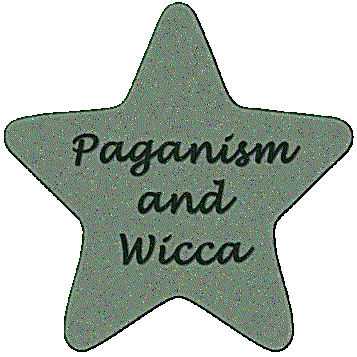
- One who is not a Christian, Muslim, or Jew; a heathen.
- One who has no religion.
- A non-Christian, professing no religion; heathen.
- A follower of paganism.
- Something related to paganism.
![]() Any
religion other than Christianity, Islam, or Judaism and generally categorized
as an earth religion (pagan literally means "country dweller").
Any
religion other than Christianity, Islam, or Judaism and generally categorized
as an earth religion (pagan literally means "country dweller").
Paganism is more a philosophy and an intimate, person to person way
of life. There are many different paths of Paganism . . .
the Wiccan Way is but one path. There are Pagans the world
over who worship the Earth Mother and the Sky Father, the Rain God and
the Rainbow Goddess, and the Little People in the mists on the other side.
A Pagan is one who worships the Goddesses and Gods of
nature, realizing the powers of the universe exist - not apart - but as
part of mankind, and these powers may be contacted and benefit may be
gained from them.
Pagans are usually polytheistic (believing in more than one god), and
they usually believe in immenance, or the concept of divinity residing
in all things. The practices of Paganism derive from those
of Wicca, but are not identical with those of Wicca. Some
say that Witches are the clergy of Paganism. Paganism is
a broad, eclectic contemporary religious movement that encompasses shamanistic,
ecstatic, polytheistic, and magickal religions. Most of the
religions termed Pagan are characterized by nature-centered spirituality,
honoring of pre-Christian deities, dynamic, personal belief systems, lack
of institutionalization, a quest to develop the self,
and acceptance and encouragement of diversity.
![]() There
is more than one path to the truth and it is not always in plain sight
. . . A Pagan does not believe that man is born innately "sinful" and
realizes that the concept of sin is harmful to human nature.
A Pagan knows that man is not better than woman, nor woman superior to
man.
There
is more than one path to the truth and it is not always in plain sight
. . . A Pagan does not believe that man is born innately "sinful" and
realizes that the concept of sin is harmful to human nature.
A Pagan knows that man is not better than woman, nor woman superior to
man.
Most followers of Pagan beliefs feel that, if someone is meant to find
the Pagan path, he/she will eventually. Being polytheistic,
Pagans believe in a great many Goddesses and Gods. However,
not all Pagans believe in the same ones. Many believe in
a Goddess and a God that are manifest in all things. Some
follow particular
pantheons - e.g. Greek, Irish, Norse, Yoruban, Welsh. Still
others see the Divine in more symbolic terms. Many attribute
certain qualities to different Goddesses, such as Athena as the Goddess
of wisdom; Aphrodite as the Goddess of love; Artemis as the Goddess of
the hunt, etc. Many pagans and Witches see the Goddess in
three aspects - those of Maiden, Mother and Crone; and the God in two
- the Young God and the Old God. And many other Pagans honor
spirits and/or totems in various forms such as animals or trees, as in
many of the Native American religions.

![]() While
the largest segment of the Pagan population is Caucasian and middle class,
Paganism cuts across all lines, whether racial, occupational, or class-
or gender-based. Most have interests in ecology, creativity,
and personal growth, and come from the scientific, computer, and technical
fields.
While
the largest segment of the Pagan population is Caucasian and middle class,
Paganism cuts across all lines, whether racial, occupational, or class-
or gender-based. Most have interests in ecology, creativity,
and personal growth, and come from the scientific, computer, and technical
fields.
Paganism as a movement grew out of the growing environmental awareness
in the 1960s, though it encompasses some traditions from the Middle Ages
and earlier. It is a nature-based religion, and as such,
Pagans rethink the way in which we relate to the Earth. In
other words, rather than seek dominance over the environment, Pagans work
to live as a part of Nature. And, one of the most characteristic
elements of Pagan religions is their adaptability. In the
case of nature-based religions, some will differ from others simply because
their practitioners live in different parts of the country.
There is no one spokesperson for Paganism, no charismatic guru; each Pagan
is independent and autonomous, even when working in groups, all value
choosing one's own path and beliefs.
![]() Pagans
believe that religions must change to meet the needs of people on an everyday
basis, and myths, rituals, and techniques are adapted to meet particular
needs. Each person's particular technique is honored in the
understanding that our aims are often the same. While some
Pagan religions can be quite esoteric, most Pagan beliefs and practices
are rooted in everyday, natural experience.
Pagans
believe that religions must change to meet the needs of people on an everyday
basis, and myths, rituals, and techniques are adapted to meet particular
needs. Each person's particular technique is honored in the
understanding that our aims are often the same. While some
Pagan religions can be quite esoteric, most Pagan beliefs and practices
are rooted in everyday, natural experience.
Paganism is the oldest religion known to humanity.
It's actual origins are obscure, but believed to have arisen with
humanity's desire to explore the unknown, to seek unity with the Divine
Force or Energy. Modern Pagans are men and women of all ages,
from all walks of life, from vaious racial or cultural backgrounds.
One thing they all have in common, is they have made a positive
choice to follow a path of individual spiritual growth that is in harmony
with the Earth upon which we live.
Pagans do not believe in a dualistic viewpoint of absolute opposites;
of "good versus evil". Most Pagans believe in reincarnation.
Deity - both imminent and transcendent - is perceived as both male
and female. In most Pagan religions, each individual is a
Priest or Priestess in his or her own right. Pagans do not
"worship" trees or rocks . . . however, they do revere the divine force
which is contained within trees and rocks and every part of the universe.
Ultimately, the practice of Paganism is a voyage of self-discovery,
and the discovery of one's own place within the divine realm.
Pagans believe that each individual has the right to worship in their
own way; there is no legislation that requires Pagans to follow any prescribed
manner of worship. Pagans are not concerned with perverting
the sacred symbols, beliefs or practices of any other religion.
Pagan children are taught to honour their family and friends; to
have integrity, honesty and loyalty; to treat the Earth as sacred, and
to love and respect all forms of life. Pagans do not perform
sacrifices (other than of their own energy and time), and are not opposed
to any other religious beliefs. Like most religions, Paganism
has Rites of Passage, with some traditions having a formal set of rituals
for birth, marriage and death.
Rituals to celebrate a birth - often includes a naming ceremony - do
not promise the child to the religion, in the way of a Christian baptism.
It is a strong Pagan belief that each individual must follow his
or her own path . . . parents will often ask for divine guidance and protection
for their child, but will not make any promises about bringing the child
up in a particular faith. Many Pagan parents will ensure
that their children are exposed to the teachings of a number of religions,
so that the child receives a well-balanced spiritual education.

AKA Shari Lyne. All rights reserved.
Most artwork originally created by Shari Lyne/StoryTeller;
if you own the copyright to any original image used for the creation
of the graphics on this site please e-mail with proof of copyright.
Upon receipt of said copyright, credit or removal of your image will be done.

